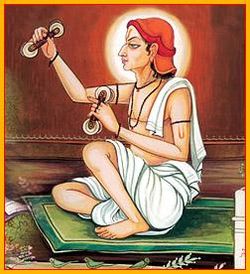Narsi Mehta also known as 'Narsinh Mehta' or 'Narsi Bhagat' (1414-1481), was a poet-saint of Gujarat, India, notable as a bhakta, an exponent of Vaishnava poetry. Narsi Mehta, hailed from Gujarat where the Bhakti movement had travelled to and then farther off to Kutch and Sind through Rajasthan and Punjab. Narsi Mehta was a Vaishnava devotee and sang the praises of Lord Krishna. Narsi Mehta was the first devotee whose songs, about 740 in number, became very popular. He sang of his love for Krishna and His sports or frolics, and attracted people by the depth of his faith and simplicity wherever he went.[1]
Early Life
Narsi Mehta belonged to a Vadanagar Nagar-Brahmin family of Junagarh in Kathiawar, Gujarat. He was born of a very poor family. From his very boyhood he had great devotion to Lord Krishna. He lived with his brother. All the time he kept singing songs on Krishna and Gopi Lila and dancing in ecstasy. As he did not care a bit for any of the household matters and as he did not earn anything, his brother's wife taunted and ill-treated him. Narsi Mehta never entertained any idea of earning his livelihood. He had the firm conviction that Lord Krishna would provide him with all his wants. This was due to his previous Samskaras. He was of a happy-go-lucky nature. He did Tapasya at Gopinath, situated on the seaside. He had the Darshan of Lord Krishna through the grace of Lord Siva. He came back to his house and got married. He had a son by name Shyamaldass and a daughter by name Kunwarbai.[2]
Miracles
- Many miracles happened in Narsi Mehta's life. He had direct Darshan of Lord Krishna on several occasions. Once he was moving with his brother along a road. He was very hungry. He could not get any food on the way. There Lord Krishna took the form of a shepherd boy and gave him good food in a small cottage. Narsi asked his orthodox brother to partake of the food and said to him that it was Lord Krishna Himself who was serving him. His brother had no faith. Narsi and his brother continued their journey onwards. Narsi's brother forgot to take his vessel from the cottage. He ran back to the place and found out the vessel, but there was neither cottage nor shepherd boy. It was all the grace of Krishna, who served His Bhakta to keep up His word in the Gita:
- Ananyaschityanto Mam Ye Janah Paryupasate Tesham Nityabhiyuktanam Yogakshemam Vahamyaham[3]
- On another occasion, Narsi was performing his father's Sraddha (the annual offering of Pindas to the departed souls). There was shortage of ghee. Narsi went to the bazaar to purchase ghee. On the way he met a Sankirtan party and joined them. He began singing Hari Bhajans and dancing in an ecstatic mood. He entirely forgot all about Sraddha and ghee. His poor wife was waiting and waiting anxiously for him. Two miracles happened then. It was all Krishna's grace to help His Bhakta. The first miracle was that the sun did not move a bit in the firmament. It stood still. Nobody knew how much time had actually passed. Secondly, Lord Krishna assumed the form of Narsi, brought ghee and handed it over to Narsi's wife. She gave mild rebuke also to Krishna who was there acting the part of Narsi. All the Brahmins were nicely fed. They departed with joy. The function was over. Narsi's wife started arranging the things and cleaning the room and the verandah. Then came Narsi with ghee in hand and apologised to his wife for coming late.[2]
After the death of his wife and son, Narsi became more free. He began devoting all his time to worship and singing of Bhajans. He became an Ativarnashrami. He broke down all caste rules and observances. He held Kirtan everywhere, even in the houses of sweepers and men of inferior caste. The other Nagar-Brahmins hated Narsi and also outcasted him. They refused to admit him in one of their feasts. Another miracle happened now. A Dom or a man of inferior caste was found by the side of each Brahmin. The haughty Nagar-Brahmins were cowed down. They began to show respect to Narsi. They openly admitted and declared that Narsi Mehta was a great Bhakta.





